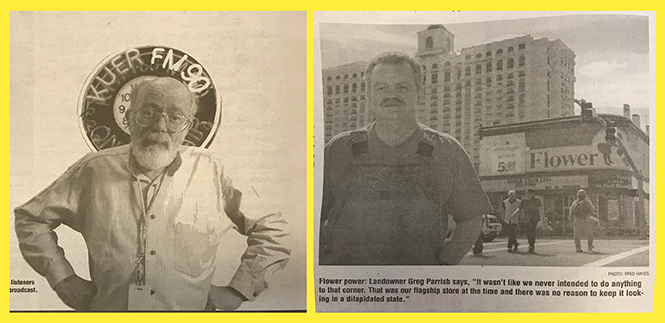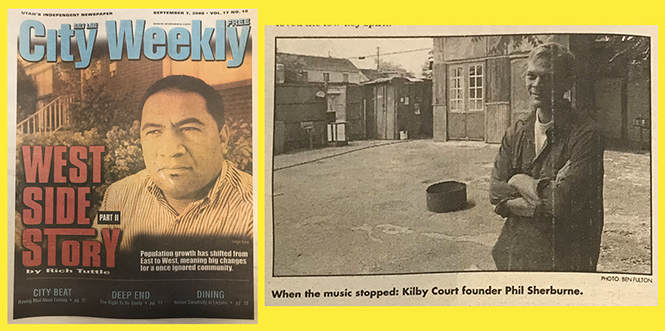In a fresh and shiny new century, a future Salt Lake City was taking shape. And filling the pages of City Weekly in its 17th year were many instances of this process in action—whether great or small, discordant or harmonious.
The growth of the city's Latino population had awakened an effort by fearfuls to push a ballot initiative discouraging multi-lingual governmental materials. The Deseret News vied for controlling interest in the Newspaper Agency Corporation after The Salt Lake Tribune's owners sold the paper and attempted to buy it back in a federal tax dodge. Teachers along the Wasatch Front walked off the job in protest of dismal per-pupil funding, and the ragtag indie venue Kilby Court was nearly shut down by the city for operating without a license.
A massive mall by the airport was under consideration, the old Murray smokestacks came down, and the relocation of the Hansen Planetarium became a political football. And of course, there was some dispute over the presidential election results between George W. Bush, Al Gore and Ralph Nader.
Among the highlights of City Weekly's cover stories included Rich Tuttle's two-part series on the changing demographics of Salt Lake's west side, Mary Dickson's report of a proposed deal to store radioactive waste between Private Fuel Storage and the Goshute Reservation, and Anne Golden's profile of those living with the skin condition epidermolysis bullosa.
There was a story by Deborah Botté on KUER FM's cancellation of Gene Pack's (1932-2019) beloved classical music radio program, Scott Renshaw's piece on West Valley's Redwood Drive-in Theatre and Alexander Nibley's well-received article addressing the stranglehold of Republican politics upon local Mormons despite their church's directives against one-party rule.
John Saltas mourned his family's beloved Doberman, Sadie, and developed a love for the Mexican chelada, Nesreen Khashan followed the war between Flower Patch proprietor Greg Parrish and Grand America Hotel's Earl Holding, and Ben Fulton profiled the Minnesota indie rock band Low.
If you needed something to help focus your mind or calm your nerves, City Weekly had you covered—crossword puzzles were featured in the weekly newspaper beginning in this year.
Remembering Vol. 17: In the bills
Throughout City Weekly's 17th year, political reporter Katharine Biele covered the intricacies and fallout surrounding HB320. Drafted by honchos at Questar Corporation (since acquired by Dominion Energy), HB320 did away with the Committee of Consumer Services and created a hybrid regulator that by law could argue a case from both sides. It passed into law unsigned by then-Gov. Mike Leavitt, whose father happened to be a director within Questar's organization.
"Here's a company that makes some really bad business decisions and then writes its own bill so regulators will pretty much be neutralized, leaving the company to charge what it pleases," Biele wrote on Nov. 9.
Thanks to the sustained efforts of local consumer advocates like Claire Geddes, Betsy Wolf and Jeff Fox, the outcry against this law was so strong that lawmakers agreed to revisit it in the subsequent legislative session. "By putting pressure on us, you brought those people to the table with a full deck of cards," burnished then-Rep. David Ure, the bill's sponsor. "People now are sick enough of this [HB] 320 that they're willing to work."
Biele was less than enthralled by this particular gloss of the pressure campaign. "Take this argument to its logical conclusion," she observed on Aug. 24, "and you have legislators passing laws they don't understand, and working on the details only under duress."
Lawmakers floated the idea of making the Committee of Consumer Services an independent entity, which sounded nice on the surface until one realized it was still affected by whatever the governor-appointed head of the Department of Commerce chose to do with governmental pay rates.
"In the world of politics," Biele concluded, "independence is a puppet on somebody's string. And Utah legislators, you may have noticed, are loath to cut the string called influence while ignoring the one labeled oversight."
Biele ran a "Questar Watch" in her weekly column, tracking the company's stock prices in the aftermath of HB320. "The weekly Questar Watch has been driving 'em nuts on Capitol Hill, not to mention over at Questar HQ," Christopher Smart remarked on Feb. 1. "We even got a letter from one Questar official [Chad Jones] calling 'Questar Watch' irresponsible journalism. Then we knew we were on to something."
After natural gas rates skyrocketed and the public pressure continued unabated, HB320 was at last repealed by the Legislature. But as is always the case with consumer victories, the struggle never ceases. By March of 2001, Ure had inserted a line into an appropriations bill funding governmental department salaries, stipulating that the Committee of Consumer Services was to be moved away from the physical locations of the Division of Public Utilities and the Public Services Commission.
"Having failed to eliminate the Committee of Consumer Services," Biele wrote on March 8, "Ure apparently settled for sending it packing. Literally."
In the walls
"If you want an idea of precisely how ineffectual we have been over the years, how ineffectual all of the media have been and how ineffectual our historical preservation groups have been at saving historic landmarks, just look around," wrote John Saltas on Feb. 1. "Now that you've seen the glass and the metal, the parking lots and empty lots, look while you can at what had been a battle cry building of all those concerned about historical preservation: the Brooks Arcade at the corner of 300 South and State."
That venerable building of sculpted masonry in the Richardsonian Romanesque style had graced the cityscape since 1891. But with its sale to the Arizona-based AlphaGraphics, only the outward facade would remain while all else would be replaced.
"The Arcade's facade is being preserved only to make the powerful feel better about the beneficence of their rule," Bruce Baird fumed on May 10, comparing it to the stories of old Potemkin villages that supposedly impressed Russia's Catherine the Great.
The Brooks Arcade was far from the only structure with a wrecking crew appointment, as the Shubrick Building (1912) at 400 S. West Temple also had its fate sealed this year. Long known as the home of the Port O' Call private club, the Shubrick was slated for demolition to make way for an expansion of the Frank E. Moss U.S. Courthouse.
This subsequently set the City Weekly offices for future relocation, as they had been operating in this area at 60 W. 400 South since the early 1990s. At the very least, the 1891 Odd Fellows Hall (26 W. Market St.) was spared, albeit moved and rotated from its original location.
In one quote
"Materialism and morality have an inverse relationship. When one increases, the other decreases."—Arun Gandhi, grandson of Mahatma, to a University of Utah panel, as quoted in an April 5 editorial.
In production
"If everything went well last night at the press, you should have no trouble reading this," wrote John Saltas for the March 1 issue. "We are now in our second week of printing City Weekly at a new facility, one as modern as any in the country. Many of you have already commented on the marked improvement in the quality of our paper."
Having outgrown the printing facilities in the immediate area, City Weekly relocated its production to Ogden. Using the presses of the Ogden Standard Examiner, City Weekly was now fully digital, transmitting its pages electronically to the folks up north.
"So, for a while some of our data may not be talking correctly to their equipment," Saltas informed the Weekly's readers. "That could mean funky looking ads, or even pictures missing, like in last week's Zephyr ad. Sorry, Sam."
More by Wes Long
-
40 Years of City Weekly—Volume 37: 2020 to 2021
City Weekly Rewind
- May 1, 2024
-
40 Years of City Weekly—Volume 36: 2019 to 2020
City Weekly Rewind
- Apr 24, 2024
-
40 Years of City Weekly—Volume 35: 2018 to 2019
City Weekly Rewind
- Apr 17, 2024
- More »







